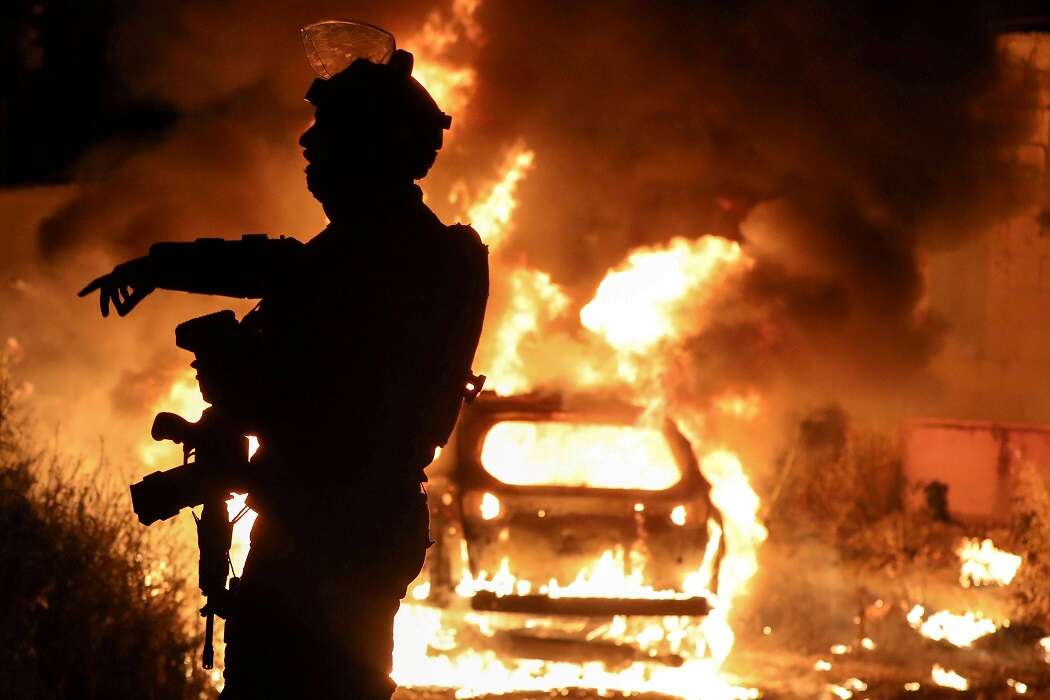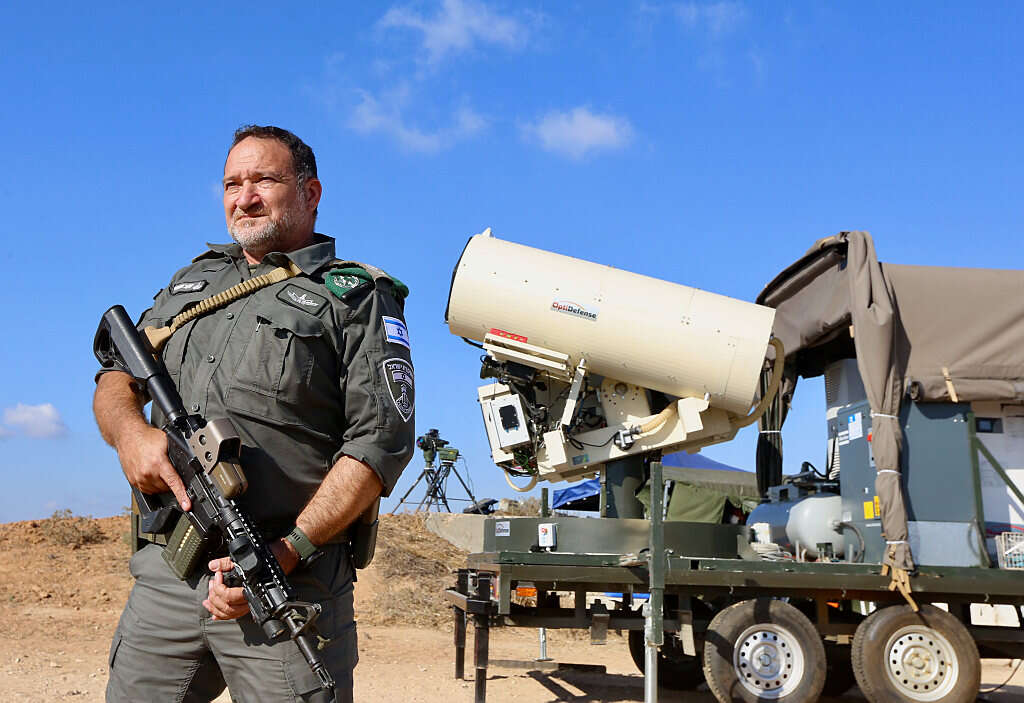On a shelf behind Israel Police Commissioner Kobi Shabtai's desk stands a small bust of an armed Roman legionnaire. "We learned a lot from the Romans," he says with a smile when I ask him about it at the end of our interview. "We employ their tactics to disperse demonstrations – shield formations, defensive lines, kettling – I learned it all from them. We are good at a lot of things, but in recent years I have begun to feel that we have forgotten the basics. That's why we have started using batons again."
Follow Israel Hayom on Facebook and Twitter
Shabtai looked as if he would have been happy to give a long lecture on Roman tactics were he not short on time. The impression he gives is that these issues spark his fire far more than administration, and it's not for nothing that he talks of his years in the field as "the best of my life."
Returning to the Roman analogy, one could say that in recent months, Israelis have experienced a difficult period that is reminiscent of events in the history of the Empire, such as the invasion of the Vandals and the sacking of Rome. In Lod, Jaffa, Acre and the Negev, Israelis saw unprecedented riots, but the Legion did not turn up.
"If you were to ask me if we expected these events the answer would be no," he admits. "Tensions were high, but nobody expected anything like that."

Q: Where did you go wrong?
"It's too early to tell, we are still checking ourselves. Personally, I am absolutely sure that social media played a big role. That's something that we haven't experienced in the past and each event sparked the next. It started with attacks on the ultra-Orthodox in Jerusalem and moved on to all sorts of events in Jerusalem, on the Temple Mount, and elsewhere. There are issues here that perhaps haven't been dealt with; tensions that built up in certain locations, and spread like wildfire."
Q: As a civilian, the feeling was that we were abandoned. Where were the police?
"On the day that the riots began, we didn't have enough police forces in Lod to deal with the pogrom – and I'm categorically calling it a pogrom – arson, assault, and violent events. Most of our troops, from all around the country, were concentrated in Jerusalem. With all due respect, all the police stations in Lod and the reinforcements we sent couldn't have dealt with 40 simultaneous incidents. We weren't able to do it. I want to be straightforward about that without any attempt to hide things.
"The events there were very violent. But we very quickly understood what was going on and were able to respond; we brought forces down from Jerusalem and reinforced the Border Police units that we had called in, and we also received border police units from Judea and Samaria. Within four days we managed to put down an intifada with zero deaths among the rioters. That's something that has never been achieved in Israel."
Q: This isn't the first time that we have seen an uprising like that among Arab Israelis.
"I am a graduate of the October 2000 events, a graduate of the Or Commission [into the 2000 riots]. The events this time around were much more serious, be it the use of weapons against police, live-fire against police, lynchings. From the moment we entered the fray we managed to douse the fire. Part of the reason was that we used measures that have never previously been deployed. And for the first time – and I say this to the government's credit – a state of emergency was declared in Lod, and that enabled us to restore law and order.
"In October 2000, we made almost no arrests, while here we made over 2,000 arrests. As of today, there are still 700 people remaining under arrest and there have been more than 300 indictments."
Q: People are still afraid, there is a feeling that this isn't over yet.
"The situation on the ground is agitated and similar events could erupt again. So we need to keep our finger on the pulse to make sure we maintain the situation. First of all, we need to ensure that such events do not repeat themselves, and if they do, then we will know how to provide the best response."
Q: During the events, there were reports that you blamed the riots on provocations by far-right Otzma Yehudit party leader Itamar Ben-Gvir, and that you juxtaposed the conduct of Jews and Arabs.
"I'm open to criticism. What is said behind closed doors should stay behind closed doors, and I have nothing to say about that. Clearly, with regard to the number of events, there is no symmetry – there is no comparison between the number of events on both sides, the number of people hurt, and the number of fatalities. Note that I called it an intifada.
"What I said publicly was that we will bring to account anyone who rioted and anyone who broke the law. From my perspective, any killing is murder. It doesn't matter for the moment who and why. When it comes to enforcement there is equality. When a person is killed, when a life is taken, that has to be dealt with."

Restoring governance in the Negev
In recent interviews, Shabtai has sought to present the Israel Police's work plan ahead of upcoming budget discussions. It is important to him to underscore the need to allocate resources to the police and to stress the importance of its work. He says that strategic teams have been preparing work plans, and gives away some details about things that have already been put in motion, such as establishing a motorcycle unit for large cities in order to provide residents with rapid response. "Police cars get stuck in traffic jams, and by the time they arrive, it's often too late. Motorcycle police can act quickly and provide a response."
He also speaks about the deployment of forces in the Negev where the police has established four designated command centers to deal with the challenges to governance in the region.
The police have also been busy in the Arab sector in the Galilee and the Triangle region: "Everyone talks about the Arab sector, but we didn't have resources. I took 300 officers from existing forces and deployed them to the Arab sector to reinforce police there and set up new units."
Q: Looking at police reports, the impression is that at the end of the day a lot of arrests are of young people in their 20s. It's obvious that they are "foot soldiers" in criminal organizations, but we hardly ever hear of actions against the crime bosses.
"We are everywhere we possibly can be, because you have cut off the snake's head to kill it and that's what we are trying to do. So far, I have set up three new units that are intended to deal with these issues. We have reinforced the regional units dealing with these matters, and have given them more people. One of the things we plan to attack very seriously now is the economic sphere. We can catch an endless number of criminals, but what really makes a difference on the ground is when you target their finances – that's where you can effect change. "
The commissioner's work program includes improving services for civilians, including digitization of police services, filing of complaints, collection of witness testimony etc. Just like commissioners before him, he also puts a strong emphasis on the police's public image.
"If we could only manage to publish 25% of what we do, the Israel Police's public image would be on another level. I don't want to complain about the media.
"What gets precedence on news broadcasts isn't the police officer who helps an old lady cross the road. It's more interesting when a dog bites an officer, that sounds a lot sexier. I accept that that's the way it is. We aren't devoid of errors and mistakes, and if I am wrong about something then publish it. The media needs to achieve ratings and what sells is more tabloid and less work. We are working on improving our image and getting things out there, and the Israeli police is going to be much more transparent with data and about what it does."

One of the most important topics for Shabtai is the Israel Police's work with communities – Arabs, the ultra–Orthodox, Beduins, Ethiopian Israelis the elderly, the gay community, youth, and more. "I always talk about The Policeman Azoulay [an award–winning Israeli film] as an example of how you can sometimes solve problems just by understanding someone else. We aren't there. We aren't on social media and all those groups, we aren't hearing what is said there, and we don't know what they are thinking. So when you come to solve a problem, if there is dialogue then there's a lot we can do."
One of the examples he gives is a "sabbath station" in Bnei Brak which works in accordance with the halachic requirements of the ultra–Orthodox town's religious residents.
"We try to do everything without desecrating the sabbath so that we won't be seen as an alien presence and so the residents can turn to us. There is no electronic gate at the entrance, people can write with a special shabbat pen and if we need to patrol the area, we prefer to employ non–Jewish officers."
Shabtai wants to adopt a similar approach for other sectors as well. For example, going into Arab schools to explain things like crossing guards, drug abuse, violence prevention, online violence etc. Positive engagement is also part of the program. "When does the average Arab youth encounter a police officer? When he has become a criminal. When it's too late. That has been my approach for many years, from back when I a station commander in the Arab sector. Not 'if you don't eat your dinner, the police will come' but 'the police will come to look after you.'"
When it comes to some of the issues the commissioner presents, it seems that he isn't talking to me, but, through me, directly to the audience which isn't in the room. He speaks of a "volunteering force" and of "ecological police" and other similar ideas. Rooftops of police stations have been mapped out for the purposes of generating solar electricity, senior officers are getting hybrid vehicles, recycling and other initiatives, that appear to be aimed at impressing decision makers, have been adopted. They may be less inclined to allocate resources to reinforce operational units, but when it comes to green projects, they will give a blank check. Commissioner Shabtai is a warm and straightforward person, and from his body language it seems that he understands what is really important.
Q: We have heard recently about attacks up north that seem to be connected to protection rackets. What is going on there?
"So far, nobody has said they want money, but it seems that someone at some point will turn up and offer "security services". That's our assumption. We are working on it. We are taking care of persons that we are familiar with; usually what happens is that when they are released from jail they go back to their old ways and then we catch up with them again. It takes time to figure out what is going on, and then you need evidence.

"It's not like you can just arrest someone because you suspect them or even know they have committed an offence. I have to come to court with evidence. And in order to gather evidence to present in court there are several components. The fact that I know is not sufficient, I have to establish a foundation. In Tel Aviv, for example we have uncovered an affair and made several arrests and tens of millions of shekels have been impounded for the state, and a procedure is ongoing. And there are a few other affairs in the works. We are putting a lot of effort into it."
Q: Even once you have gathered evidence and made arrests, the courts often release the suspects. Do you have a problem there?
"We won't talk about judges. I have full respect for the judicial system and for the judges. But you can see that in certain places then this is an issue for us and we appeal the decisions, and in some cases our appeals are accepted. It changes from location to location. In the south for example, the courts are okay and help us out; in other places you see a different approach. But even here in the Coastal District, you can see that during the recent riots people were placed under arrest for the duration of proceedings."
Subscribe to Israel Hayom's daily newsletter and never miss our top stories!
One thing the Commissioner prefers not to discuss is the Minister of Public Security, Omer Bar–Lev. In recent weeks Bar–Lev has taken an oppositional approach to the police. After the events in Deir al–Assad he called for an investigation into police involved in the incident – in which a resident of the Arab village was wounded by gunfire, a police officer was injured and a police car was torched – and in a hearing at the Knesset he claimed that police had acted in a discriminatory manner toward Arabs and others, stating "there are other seconds in society that the police relate to in an unequal manner, unlike regular citizens."
The commissioner chooses his words carefully in response: "I admit that I didn't hear everything he said. The minister is a politician and can say whatever he wants, whenever he wants, and I respect that. I continue to do my work in the best way I can and treat everyone equally."
Q: In the past, the police worked with civil and political organizations such as the Israel Democracy Institute and the Abraham Initiatives. Where is the police on these issues today?
"We will examine every instance. There may be a collaboration that I don't know about. I am in favor of cooperation with everyone – so long as they are legitimate, law–abiding entities, working according to required standards. I have no problem talking to anyone, so long as they aren't pulling in other directions."




